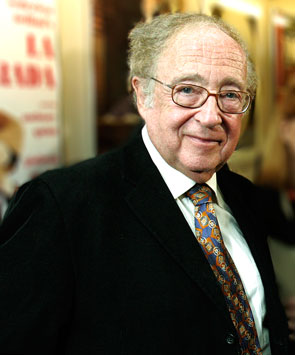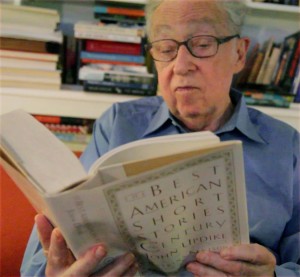Arts Remembrance: A Grateful Farewell to this Generation’s Best Champion of the Short Story
Isaiah Sheffer’s lasting contribution will be his almost single-handed revival of interest in that most beguiling of fictional forms, the short story.
By Roberta Silman

The late Isaiah Sheffer — perhaps he was drawn to the short story because he was old enough to remember the tradition of Jewish storytelling that had sustained the Eastern European immigrants.
As I sat in the Miami airport waiting for a plane home to La Guardia, I was shocked to read that Isaiah Sheffer had died on November 9th at the far too young age of 76. I was privileged to know him because two of my short stories had been read on Selected Shorts, the series that begins at Symphony Space in New York and winds up on NPR. And although Isaiah will be remembered in Manhattan for his brilliant conception of Symphony Space as a venue for all sorts of cultural events, I suspect that his lasting contribution will be his almost single-handed revival of interest in that most beguiling of fictional forms, the short story. In fact he called the program A Celebration of the Short Story.
By the time Isaiah and Allan Miller got the old theater up and running as Symphony Space, the short story had fallen into decline because, as an editor once put it to me, “stories don’t bring in magazine advertising.” So all those wonderful stories that had been published in McCall’s, Redbook, Mademoiselle, Cosmopolitan, Esquire, The New Yorker, The Atlantic, Harper’s, and so many other national magazines dwindled, and before long only a few national magazines continued publishing fiction, and usually one story per issue, a big drop from what had been happening from the ’20s through the ’80s.
I sometimes think Isaiah was drawn to the short story because he was old enough to remember the tradition of Jewish storytelling that had sustained the Eastern European immigrants who came in such droves at the beginning of the twentieth century and who relished those amazing Yiddish stories by I. B. Singer and many others in The Forvitz, The Jewish Daily Forward.
Wherever he got the idea, Isaiah is a sublime example of one man changing the course of our culture, and his accomplishments should be shouted far and wide, especially now, when so many people shrug and say one person doesn’t make a difference. Isaiah made an enormous difference by showcasing a fictional form that has always been treasured by the young whose lives are often too rushed and full to invest the time needed to read a novel. And, as his program became more and more well-known, small magazines like Glimmertrain and Zoetrope and McSweeney’s and The American Scholar joined the long list of small, often university-based reviews that continued to publish short stories. Places that have always known that sometimes a writer’s best work can be found in his stories, e.g.Hemingway, Fitzgerald, William Trevor, Eudora Welty; places that also know that some writers are only short story writers. But that “only” doesn’t mean limited. That one short story by Frank O’Connor or Grace Paley can open up a world.
Although some writers prefer to read their own work, Isaiah had a second agenda. Who better to read than actors who always needed more exposure? So he performed a double Mitzvah, and created his own tradition that resonates in unexpected ways. He knew the value of creating a community to hear a story in the form of an audience, and then he expanded that to an even bigger audience of thousands of people who could listen in the intimacy of their own homes.
By having actors read the stories, he also widened the horizons of a story. I will never forget entering the lobby of Symphony Space and having him say, “I think Kathy has a really good handle on your story.” Puzzled, I stared at him for a moment, then realized that my story now belonged to someone else. When Kathleen Widdoes read it, I was surprised to hear phrases suddenly far more meaningful than I had imagined. And conversely, other phrases I had labored over were more or less thrown away in her reading. And when Cherry Jones read another story a few years later, the audience’s reaction was so surprising that for a few moments I wondered if I had ended it in the right place.
But that is the beauty of words—each reader brings his own interpretation, which only enlarges the impact of what is written. For some writers, this can be so uncomfortable as to border on frightening. But I find it refreshing, and I suddenly had a lot more compassion for those dead and gone, but maybe listening, especially when Isaiah instituted his June 16th reading of James Joyce’s Ulysses. So many ways to tell a tale. Each year as I tuned in, I felt connected to the ancient Greeks who recited The Iliad and Odyssey to each generation, always making them new.
Isaiah made short fiction new, heeding Ezra Pound’s famous command, and for that we are forever in his debt.
Roberta Silman is the author of Blood Relations, a story collection; three novels, Boundaries, The Dream Dredger, and Beginning the World Again; and a children’s book, Somebody Else’s Child. She writes regularly for The Arts Fuse and can be reached at rsilman@verizon.net.
Tagged: A Celebration of the Short Story, Isaiah Sheffert, NPR, short story


Sheffer was indeed wise to foresee that the short story (or in the case of my work, short episodes) would be an art form that fits in so well with the way people rush.
Read and go.